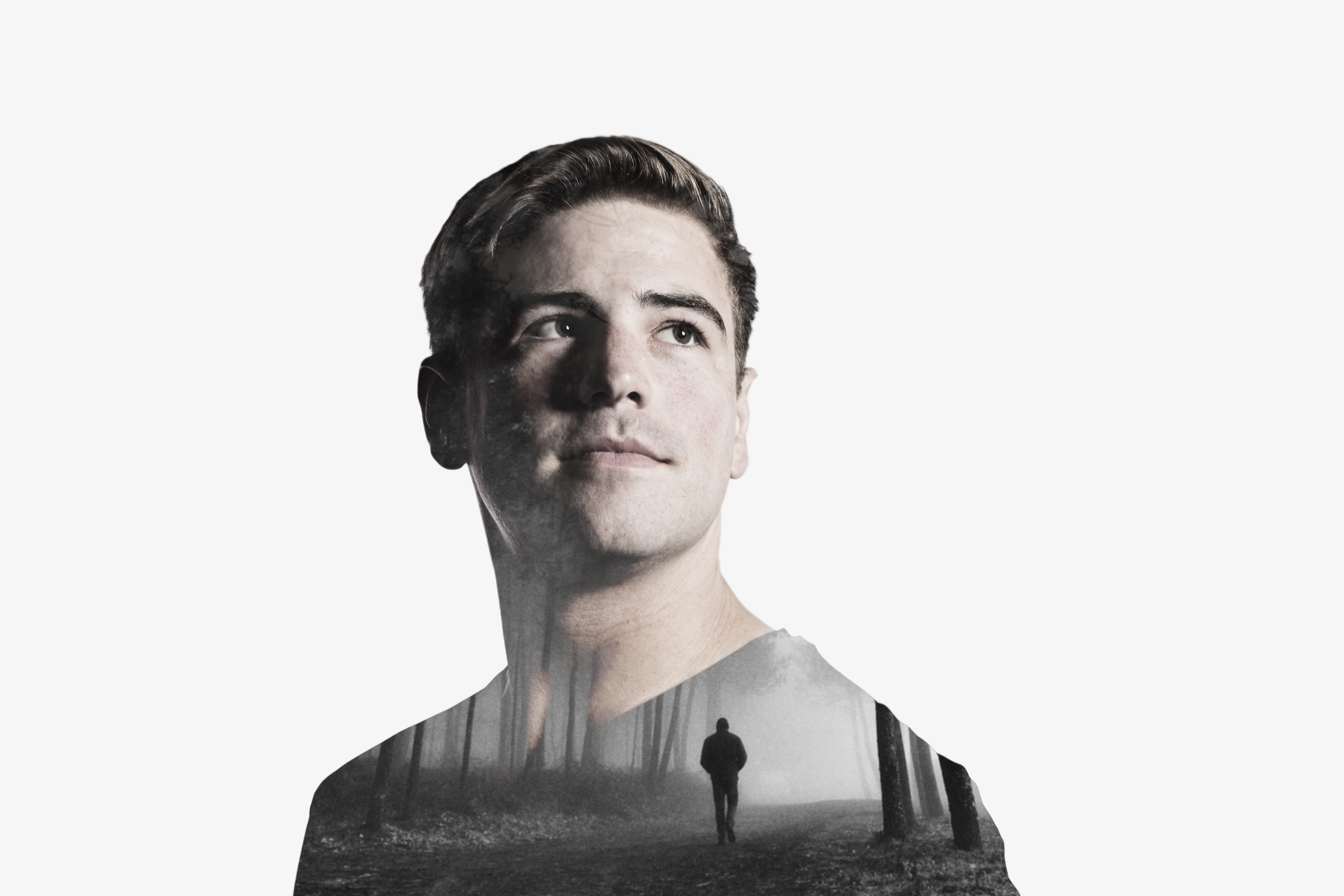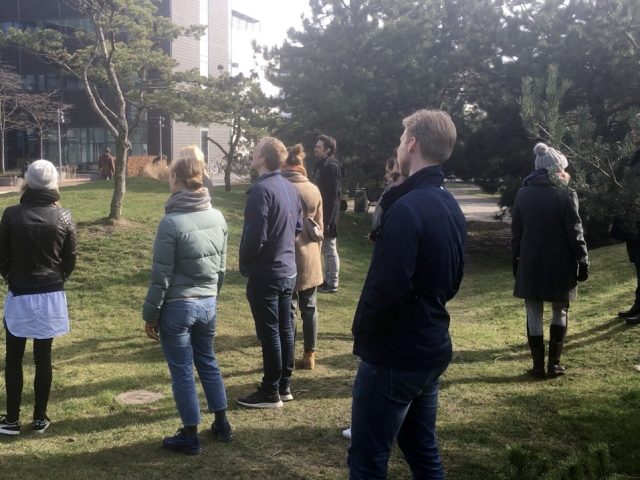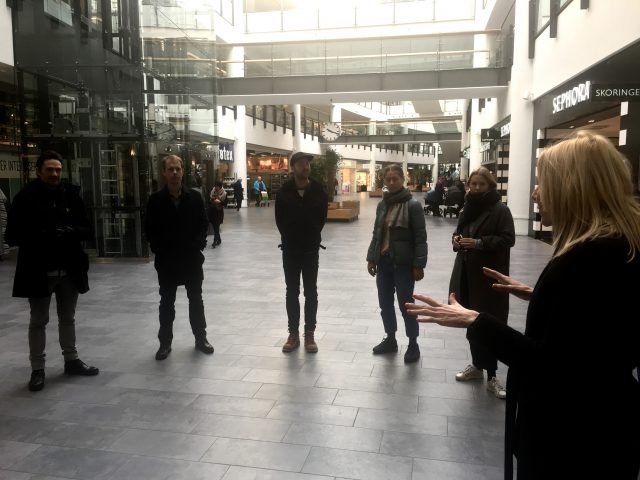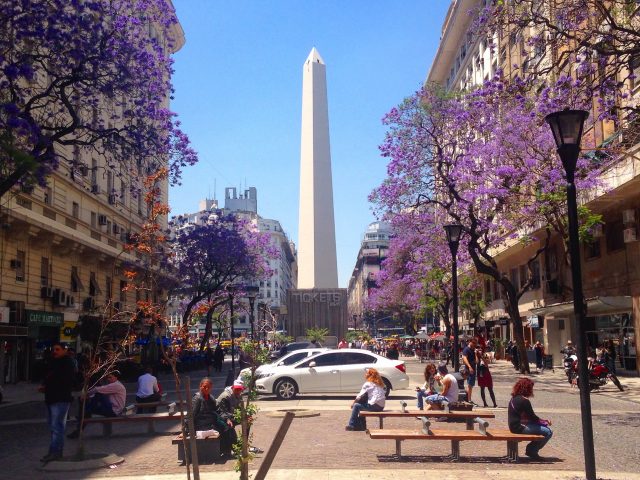Blended Learning: Silence is Golden

(Photo: Lisbeth Holten)
Having created an increase in efficiency and creativity amongst employers and employees, the question lies in whether silence is also the vital element needed to produce a better learning environment here at CBS. A class of graduate students had a short introduction to the possibilities of silent co-creation.
On an otherwise normal Thursday morning at Kilen, a class of PKL-students (Political Communication and Management) are about to start their lecture on controlling technologies in society. The students are greeted by the usual décor of a classroom with rows of tables and chairs all facing the blackboard and the teacher’s desk in front of it.
The expectation is set for today’s lecturer to arrive and perform the standard one-man power point show – but today is different.
Bastian Overgaard enters the classroom and introduces himself as a facilitator in silent co-creation. He’s today’s teacher and the main focus of his lecture is the importance of silence and how we create this together. Both inside, outside and everywhere.
Abandoning the classroom and walking around campus and Frederiksberg, the class is led by Bastian Overgaard in complete silence. He guides them through the familiar buildings and outside areas, making an occasional stop to make the students look and listen.
The silent-walk, as Bastian Overgaard calls it, concludes in Frederiksbergcenteret and here he allows everyone to talk again and reflect on what they experienced. Even though it was a short introduction to the concept, several of the students could already sense a difference in the way they observed and thought about their surroundings, each other and ultimately themselves.
Today’s class was definitely different, but could this be the new normal of teaching?
Embracing silence in a noisy environment
Having had over 10 years of experience, Bastian Overgaard is one of the leading figures in Denmark when it comes to working with the possibilities of silence.
He provides courses and workshops on how to implement silence in one’s professional and personal life via different methods. Bastian Overgaard’s primary focus is on silent co-creation, which centers around the positive possibilities one can gain from being silent in the company of others. The purpose of his presence in the PKL lecture is to introduce this method to the students and see what they can gain from it – both as students and as people in general.
People talk too much and forget to listen and reflect.
Bastian Overgaard
“There is a problem in today’s way of teaching” says Bastian. “It is the same problem that is happening in companies, where people talk too much and forget to listen and reflect.”
So even though a traditional lecture revolves around the teacher talking and the students listening, the silence provided for the students is not what Bastian Overgaard wants to encourage.
“You may not be speaking, but someone else is (the teacher) and therefore one’s focus is centered on the words being spoken. The students will not be reflective of the said things and thoughts, but will instead be thinking about what to reply if asked a question or how to engage in a possible conversation,” he says.
Silence is therefore not just something that needs to be present. It is about embracing the entity of silence and what it can provide when practiced together. This is where silent co-creation comes into the picture.


Bastian Overgaard says that for people to gain from silence, there needs to be set a given surrounding, so that one is aware of the silence. Silence is to be seen as a tool and not just as the absence of noise. Silent co-creation is therefore structured around four main elements that all need to be fulfilled in order to achieve a successful outcome.
The 4 steps of silent co-creation
The four elements are the following:
- The silence needs to be agreed upon and facilitated.
- Participants must be aware of the silence.
- The silence must be co-created and a 100% respected.
- The silence should be limited to a specific timeframe.
The argument that a reading hall or the library is a place for silent co-creation is therefore not valid, as it is vital that everyone present is aware of each other’s silence and that this silence is being practiced within a set time frame. Besides, as Bastian Overgaard mentions, “even in complete silence there is a lot of noise to get distracted by.”
With this he relates to the presence of books, computers or mobile phones. Bastian Overgaard specifies that “especially social media is very loud in the sense that it demands time and attention and does not allow the student to be reflective, but rather to always process the constant stream of information”.
The concept of silent co-creation is therefore not achievable under the circumstances of a traditional reading hall.
Especially social media is very loud.
Bastian Overgaard
So how to get silence on CBS’ agenda, if it is not possible in what seemed to be the most logical place to do it?
“It all comes down to the teachers,” says Bastian Overgaard.
Talk, talk, talk, but no action
Just like he has experienced with companies, the solution to implementing silence lies within the management, which in the students’ case is the teacher and the course responsible.
“You need someone to facilitate the silence” and with that notion Bastian Overgaard highlights the importance of not just getting the students to adopt a more positive approach to silence, but also the teachers.
The teacher’s job is to control his or her own speech as well as the students, but in this process, they often forget to control the silence as well. Bastian Overgaard believes that people are in such a hurry to talk and reply, only thinking about a response that correlates with the given conversation.
This makes everyone narrow sited, as every individual becomes pre-sited, which will result in a limited production of knowledge for everyone involved. What Bastian Overgaard wants the teachers to do instead is to set aside no more than a minute or two of silence, when having asked a question to the students. This will allow their own thoughts and reflections to bloom and not be influenced by others.
Silence should not be seen as a negative factor in a lecture or as an expression of lack of content, but rather as a room to actually enhance the potential in the materiel being taught.
But Bastian Overgaard believes there is a common misunderstanding of silence and that it has become a taboo amongst universities and companies alike.
“People always think that silent co-creation has something to do with meditation or mindfulness, but this is not the case. There is nothing spiritual about silent co-creation.”
So, besides the need of a management that is on board towards implementing silence, it is also important that the general attitude towards practicing and noticing silence is changed for the better.
There is nothing spiritual about silent co-creation.
Bastian Overgaard
Silencing stress and creating happiness
Bastian Overgaard concludes on a high note, saying that the results from implementing silent co-creation has been very positive. Several companies have over a short period of time had an increase in their employees’ happiness and energy.
This is partly due to the decrease in stress amongst both the employer and employees, and when it comes to stress, university students can definitely relate.
Students are bombarded with strict deadlines, exams and numerus pages of readings. With the packed professional and social calendars that students lay out for themselves, it’s not surprising that everyone is so stressed. That is why silence is very important to practice, as Bastian Overgaard has managed to repeat throughout his course. He adds, “it will allow one to absorb all the impressions one gets from the many aspects of life.”
The question is therefore if the time has come for silence to be taken more serious in the field of education? The PKL program is taking small steps in introducing its students to new technologies in teaching, but perhaps methods like silent co-creation should be introduced and inducted in more programs and institutions at CBS?
It could provide the school with not only better results and more creative ideas, but also with happier and less stressed students and staff. And should this not be in the interest of the school board and the various institutes to achieve these kinds of results?
The teachers are in the pole position to start the silence revolution, but it lies with the students to demand and activate the change needed.
So, even if the chairs and tables still point towards the blackboard, and even if the teachers will continue to perform their one-man power point show, claim a moment of silence and discover what you and everyone else can create from it on an academic as well as a personal level.
































































































































Comments